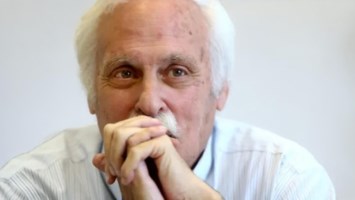
OBITUARY
Barry Cohen
November 23, 1949 – November 3, 2024

Barry Michael Cohen, 74, of Wellington, Florida, passed away peacefully at home on November 3, 2024. He was born November 23, 1949, to Samuel Cohen and Lottie Cohen (neé Diller) as younger brother to Harold (Hal).
Barry dedicated his life to the cause of justice, earnestly bearing the heavy burdens of his judicial responsibilities while enduring political attacks and eventually censure by the Florida Supreme Court in order to speak hard truths on issues that mattered. A lifelong introvert often lost in thought, he came alive when speaking about injustice, especially the ‘crime’ of ‘driving while black’, the inequities of mandatory minimum sentencing, and the all too unnecessary and far-reaching damage of the ‘war’ on drugs.
Barry was a caring son, brother, husband, father, uncle, and grandfather. He is survived by his daughter Mindy, son-in-law Matt Machera, and grandson Lucca Machera, son Jeremy and daughter-in-law Wendy Chow, brother Harold Cohen, sister-in-law Nadine Bower, nephew Mitchell Cohen and nieces Shari Bower Weitz, Jaime Bower Lewis and Alisha Bower Grimm and their families, and his dog, Arlo. His wife, Bonnie, predeceased him in 2023.
A born-and-bred New Yorker, first in Stuyvesant Town in Manhattan and later in Bayside Queens, he went upstate to attend Harpur College. In the summer of ‘71, a hippie with long black hair from Brooklyn named Bonnie caught his attention, and a mutual friend attempted to introduce them at a party. When Bonnie didn’t show, Barry sought her out, and so began their 52-years together.
After graduation, Barry moved to Miami for law school. Bonnie joined him, and they married in 1972. Bonnie worked various jobs to support them until he graduated, and the couple followed Hal and his wife Linda to West Palm Beach for Barry’s first job as an Assistant State Attorney. But his heart lay elsewhere, and so he first switched sides to join the newly created Public Defenders office to represent the poorest and most vulnerable criminal defendants, before moving into a private criminal defense practice, most notably with law partners James Green and Jim Eisenberg.
But public service was in his blood – Barry’s father was an original New Dealer who joined the Social Security Administration in the 1930s. Running for the elected office of Public Defender as a Democrat in 1980, in true Barry fashion, he never saw the Reagan landslide coming and was devastated when he lost badly. He later twice unsuccessfully sought appointment to the judicial bench with his liberal politics holding him back given a Republican governor at the time. But finally in 1990, there was an open seat on the county court and he ran unopposed, beginning an unprecedented judicial career, winning six elections each time without opposition.
For 26 years, Barry oversaw a criminal court, presiding over more than one thousand trials, touching thousands of defendants, victims, and witnesses with his kindness and humility, mentoring hundreds of young lawyers, and finding the purpose which had eluded him in the private sector. He was a unique presence on the bench, one defense attorneys hoped they would draw, but also one which most prosecutors deeply respected, even as they might grumble about a particular decision. He deeply respected law enforcement and celebrated their integral role in the broader social contract even while sometimes taking issue with their actions or strategies. Always serious in the carrying out of his responsibility, he often ruminated late into the night at home with a yellow legal pad in hand and his beloved NY Yankees on in the background, trying to find what he thought was the right balance in a particular sentence or ruling. He was most proud of his role in the case of a man previously convicted of murder and sentenced to 25 years who brought a claim for post-conviction relief because the sole eyewitness in the case later recanted his claim. Barry’s ruling granting a new trial was upheld by the appellate courts, the State’s Attorney declined to bring a new prosecution, and an innocent man got a second chance at life.
While not big on overt affection, Barry loved his family and found ways to show his devotion. He was a loyal partner and friend to his wife. To his children, he coached little league teams, helped with homework, and ensured they went to the college of their choice. And he was a model of social responsibility, serving as a beacon for all in his orbit.
Paraphrasing one of his idols, Sen. Ted Kennedy, conceding his primary challenge to President Carter in 1980, for Barry, a few moments ago, his campaign came to an end. But for all those whose cares have been his concern, the work goes on, the cause endures, the hope still lives, and the dream shall never die.
A memorial service will take place at 230pm on Wednesday November 6 2024 at IJ Morris Star of David, 9321 Memorial Park Rd., West Palm Beach, Florida. Donations in Barry’s honor and memory can be made to the Innocence Project of Florida and the United States Holocaust Museum.
Show your support
Add a Memory
Share Obituary
Get Reminders
Services
SHARE OBITUARYSHARE
- GET REMINDERS
v.1.18.0